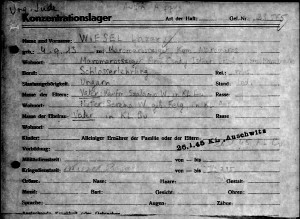Posted on September 23, 2011 at 12:58 pm
Was Lazar Wiesel a relative of Elie Wiesel?
By Carolyn Yeager
The real inmate at Buchenwald, Lazar Wiesel, 31 years old in 1944, was the son of Szalamo and Serena Feig Wiesel of Sighet.
We present the question of why the personal information on Lazar Wiesel is so close, but still far from exact, to that of Elie Wiesel. Can we believe, as Prof. Kenneth Waltzer would have it, that these were errors in taking down the information on Elie, and Lazar is really Elie? No, we can’t because the nature of the differences cannot be simple errors. Lazar had a brother Abram with him in the camps; the 44 year-old Abram (in 1944) cannot be turned into Elie’s father. And he certainly can’t be turned into Lazar’s father as only 13 years separated them. But it is very possible that the two families were related and that a part of Elie’s immediate family escaped the deportation altogether. Many so-called Hungarian Jews did – many more than are officially acknowledged. Keeping this in mind, I will examine the family names and see what they tell us.
Lazar Wiesel’s Buchenwald File Card (below) records Lazar’s father, Szalamo (equates to Sholomo), as being interned at Buchenwald.1 But more striking, Lazar’s mother, Serena Wiesel nee Feig, is listed on this card as being interned at KL Auschwitz. (As we know, Elie’s story is that upon arrival he saw his mother and sister moving away with the women and never saw them again. The idea they went to a gas chamber is pure speculation copied from other books.)
CLICK ON CARD FOR AN ENLARGED VIEW. Buchenwald Registration file card for Lazar Wiesel, birth date Sept, 4, 1913, arriving on Jan. 26, 1945 from KL Auschwitz.
Elie Wiesel’s parents are known to be Shlomo and Sara (or Sura) Wiesel, nee Feig.
In Jewish Orthodoxy (the Wiesel’s were members of the Hasidim sect) and in Eastern Europe generally, certain family names were repeatedly used—recycled if you will. This is certainly the case in the Wiesel family with the names Eliezer, Elisha, Shlomo and Sara, and probably some others we don’t know about.
It’s no surprise that we find the name of the founder of Hasidic Judaism to be Rabbi Yisroel ben Eliezer, and that he was born to Eliezer and Sara in Okopy, a small village that over the centuries has been part of Poland, Russia, and now Ukraine.
Wiesel was named after his grandfather Eliezer. His other grandfather on the maternal side is Dovid Feig.
Looking for genealogical information on Elie Wiesel is a disappointing affair—so little can be found. For such a famous person, a Nobel Peace Prize Laureate, to have his family history wiped away, hidden or not known is strange indeed. How to explain it when Hasidic family ancestry is traditionally honored and held in high esteem. It must be purposely hidden. The Jews talk about Adolf Hitler hiding his ancestry. Not at all. Hitler’s complete and accurate genealogy is available on the Internet, but Wiesel’s is not. How do we figure that?
The #1 site on Google Search for Wiesel’s genealogy is Geni which has only very limited information. There is nothing additional to be found on Wikipedia. I have filled in the gaps with two pages of testimony from Yad Vashem’s online database—one for his father that Wiesel filled out himself, and one for his father’s mother, Nisel, that was filled out by her grandson Eliezer Shlomovitz, who lives in Los Angeles, CA. This is all I could uncover and I do not guarantee the correctness of any of it.
Father: Shlomo Elisha Wiesel
- Parents: Eliezer Vizel and Nisel Vizel nee Bash. This grandfather Eliezer died serving on the side of the Austro-Hungarian Empire in WWI.
- Nisel was born in Chust (or Hust, not far from Sighet), later Ruthenian-Czechoslovakia , in 1880 to Moshe and Yehudit Bash, according to a Yad Vashem death report (mentioned above).
- Shlomo is said by several sources to have been born in 1894, but I think this is deduced from the book “Night” where he is said to have been age 50 in 1944. If this were correct, it would make Shlomo’s mother’s age 14 when he was born — highly unlikely. Elie Wiesel never gives his father’s or mother’s birth dates though it’s not like he doesn’t know.
- Wiesel writes in his memoir All Rivers Run to the Sea that he met his father’s brother Samuel in New York, but he has never written about his cousin Eliezer Shlomovitz in Los Angeles.
Mother: Sara Feig Wiesel
- Parents: Dodye (Dovid) Feig; no mother given
- Wiesel highly praises this grandfather in All Rivers and writes, “… in 1944 my parents invited him and his wife to live with us.” His wife, not ‘my grandmother.’ That is the only mention of ‘her.’ Seems clear she was not Elie’s grandmother, but a new wife. In any case, grandfather Feig declined and went to stay with his sons.
- Elie writes in All Rivers: “I had four uncles on my mother’s side: Chaim-Mordechai, Ezra, Israel and Moshe-Itzik
- He met an ‘Uncle’ Morris in New York.
From the little we have available, we can see certain names repeating. Elie Wiesel gave his son his father’s name, Shlomo Elisha. He himself was named after his paternal grandfather Eliezer. A cousin, another grandson of his paternal grandmother, is also named Eliezer. This cousin’s last name is Shlomovitz. From this we can begin to ascertain that Eliezer, Shlomo, Elisha and Sara are “family names” within the extended Wiesel family, along with being Hasidic names.
Two marriages between the Wiesel’s and the Feig’s
Looking back at the Lazar (from Eliezer) Wiesel who was at Buchenwald, we see another marriage between the Wiesel’s and the Feig’s. We see the same names: father is Szalamo (Shlomo); mother is Serena Feig. Lazar is 15 years older than Elie and his brother Abram is 28 years older, and they are from the same city, Sighet. It seems pretty clear to me that these are two branches of the family tree.
Matchmaker, Matchmaker, make me a match!
 Orthodox men and women usually meet through matchmakers in a process called a shidduch. A matchmaker’s services are necessary because of the constant intermarriage going on within the closely knit Orthodox communities. A matchmaker (shadchan) knew of the relations between those in the community, or could find them out, and could therefore prevent or warn against marriages between a couple who were too genetically similar. This role is not mentioned on Wikipedia and other Jewish sites, but it’s the most important one. In Night, Wiesel wrote that in 1943 his mother “was beginning to think it was high time to find an appropriate match for Hilda” who was already 21 years of age.2
Orthodox men and women usually meet through matchmakers in a process called a shidduch. A matchmaker’s services are necessary because of the constant intermarriage going on within the closely knit Orthodox communities. A matchmaker (shadchan) knew of the relations between those in the community, or could find them out, and could therefore prevent or warn against marriages between a couple who were too genetically similar. This role is not mentioned on Wikipedia and other Jewish sites, but it’s the most important one. In Night, Wiesel wrote that in 1943 his mother “was beginning to think it was high time to find an appropriate match for Hilda” who was already 21 years of age.2
The two families, Feig and Wiesel, may have been recognized as having diverse enough genetic relationship to one another to make for viable marriages. Perhaps there was a history of successful unions between the two family lines. In any case, it can explain the similarity in personal information between the older and younger Wiesel, and also the temptation to claim the one to be the other. The family members can be trusted to remain silent about it.
This last part is speculation, but one thing we notice is that Elie Wiesel does not want us to know who or where are the members of his family, and even more, he doesn’t want any of his family members to talk to us, the general public. We are not to know anything but the simplistic legend that he and his supporters and defenders have created for our consumption.
An interesting side-note: I just discovered a book From Generation to Generation by Arthur Kurzweil, published in 2004, which features on the cover “Foreword by Elie Wiesel.” This foreword turns out to be only one page long, much shorter than the Acknowledgements even, and consists of a few vague words about the mystical aspect of names. What is interesting is that the book is 400 pages of “how to research your Jewish genealogy.” If Wiesel has researched his own, he certainly is not publishing it. Wiesel gives himself the prerogative of remaining a very private man, while working hard to become a highly public name. Jewish chutzpah at work.~
Endnotes:
1. Myklos Gruener never mentioned a father for Lazar and Abram, only his own father.
2. Elie Wiesel, Night, Hill and Wang, 2006 (original copyright 1958), p. 8
Categories Featured | Tags: Abram Wiesel, Buchenwald, Elie Wiesel, Lazar Wiesel, matchmakers, Sara and Serena Wiesel nee Feig, Shlomo Wiesel
Leave a Reply
By submitting a comment here you grant Elie Wiesel Cons the World a perpetual license to reproduce your words and name/web site in attribution. Inappropriate or irrelevant comments will be removed at an admin's discretion.



1 Comment to Was Lazar Wiesel a relative of Elie Wiesel?
Trackbacks